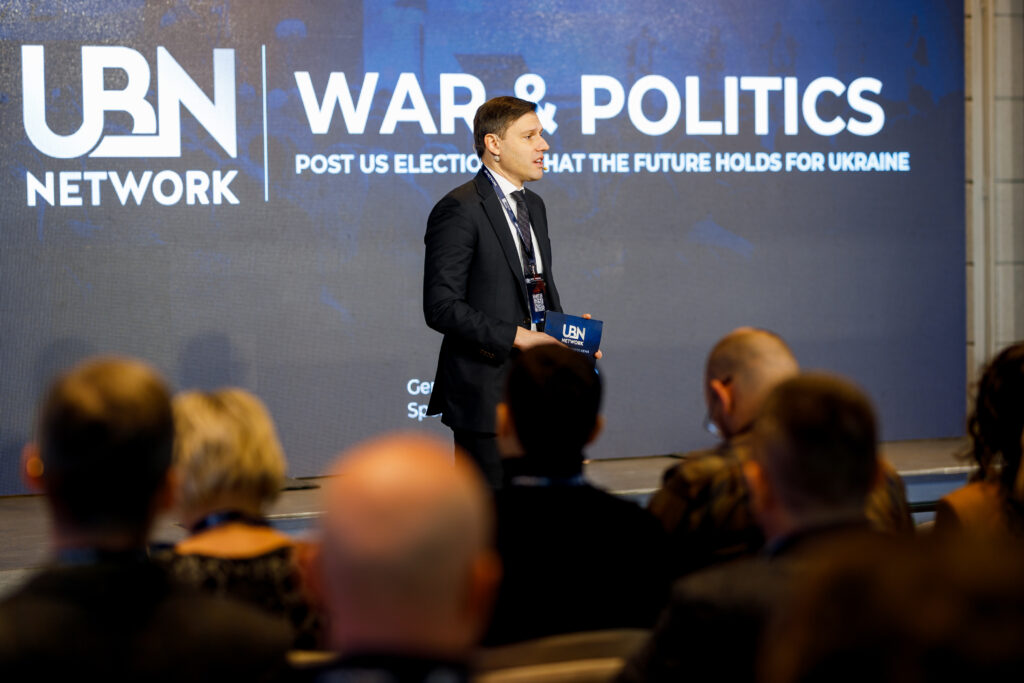On December 13, the UBN Network hosted an event titled “WAR & POLITICS: POST US ELECTIONS – WHAT THE FUTURE HOLDS FOR UKRAINE.” As the general sponsor of UBN’s series of events, Piraeus Bank supported this critical discussion about Ukraine’s future in the context of rising global political changes.
The event brought together diplomats, business leaders, government officials, and geopolitical experts to discuss the impact of the recent U.S. elections on Ukraine and what Ukraine should expect from President-elect Donald Trump. The agenda covered insights into the intersection of war, politics, and economic recovery and included perspectives from key thought leaders and experts from Washington, DC, and Kyiv.
Mark McNamee, UBN Network Co-Founder, presented an overview of the Macroeconomic, Business, and War Outlook, analyzing Ukraine’s current challenges amidst ongoing conflict and global economic uncertainty. The war-ending possible scenarios presented by the speaker have attracted much attention and debate in the room. The live polling during the conference showed that about 65% of the audience would agree on land for a peace deal, which is about 15% more than 6 months ago.
One of the most moving moments was a talk by Dmytro Kanupier, an Azov soldier, who shared his story of surviving 28 months in Russian captivity. His account deeply resonated with the audience, highlighting the resilience and strength of those defending Ukraine.
John Herbst, Former U.S. Ambassador to Ukraine and Senior Director at the Atlantic Council, joined the UBN Network event from Washington DC and delivered the keynote address, “What Trump Means for Ukraine.” He analyzed how a potential Trump administration could shape U.S. policies toward Ukraine. John called President Zelenskyi’s recent willingness to consider a Land for Peace deal “a smart move”, showing his willingness to end the war, while Putin is seen as a warmonger. He added that Yermak’s trip to Florida and meeting with the Trump team had a positive outcome, showing a good dialogue between the new US Administration and Kyiv.
Steven Moore, Republican political strategist and former U.S. Congress Chief of Staff, spoke live from Washington, DC. After recent meetings with Republican colleagues on Capital Hill, he noted that the Trump administration and the Republican party are determined to negotiate from a position of strength and will not be weak in the coming talks. After the inauguration, this will be Tump’s war, not Biden’s, and therefore will be accountable for the war. Trump never looked weak during his entire career, and he and his team, including Waltz and Rubio, support a stronger deterrence against Russia.
The event’s highlight was a dynamic panel discussion featuring prominent voices in diplomacy, politics, and business:
- Oleh Shamshur, Former Ukrainian Ambassador to the U.S. & France
- Jock Mendoza Wilson, Director of International and Investor Relations at System Capital Management
Their discussion explored whether a peace deal in Ukraine could realistically be achieved in 2025, including potential conditions and obstacles. They also addressed how support for Ukraine might evolve under a Trump administration and the implications of a Republican-led House and Senate on U.S. policy. Additionally, they examined the future of U.S.-Europe relations and how this dynamic could impact Ukraine. Lastly, they considered whether a U.S. pivot toward focusing on China might present challenges for Ukraine, particularly in maintaining international support and attention.
“Piraeus Bank remains committed to supporting initiatives that foster meaningful dialogue and drive impactful change. Together with the UBN Network, we aim to contribute to a better understanding of Ukraine’s path forward in these critical times,” – Yannis Kyriakopoulos, Chairman of the Management Board at Piraeus Bank, shared.
